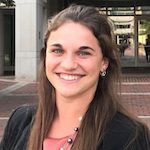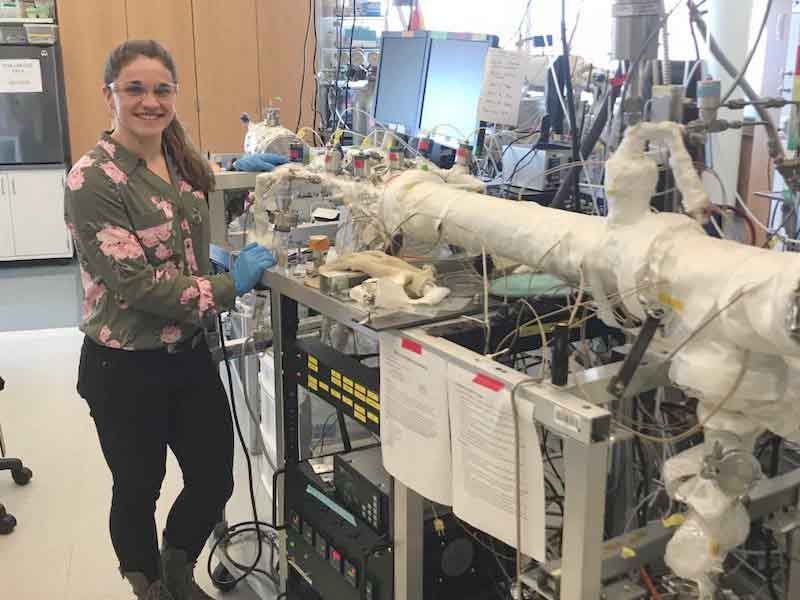The Society of Vacuum Coaters (SVC) Foundation Scholarship Fund has awarded several scholarships to students studying a field related to vacuum coating technology.
The SVCF usually awards three or more scholarship awards annually, generally in amounts up to $5,000.
Anyone attending an accredited technical, vocational, two-year, undergraduate or graduate school may apply. Students must be enrolled full-time during the semesters of award.
The following students received scholarships:
Rachel Nye, a PhD student at North Carolina State University, is recipient of a 2021 J.A. Woollam Company Scholarship from the SVC Foundation.
 Rachel NyeRachel writes “I would like to sincerely thank you for providing the J.A. Woollam Company Scholarship. I am very honored to have been selected to receive this award.”
Rachel NyeRachel writes “I would like to sincerely thank you for providing the J.A. Woollam Company Scholarship. I am very honored to have been selected to receive this award.”
“I would like to briefly introduce myself and summarize my opportunities with this scholarship. I am a 4th year PhD student studying chemical engineering at NCSU. I work under Dr. Gregory Parsons to understand growth mechanisms in molecular layer deposition of polyurea. Starting in September 2020 I have been expanding my work to area selective deposition of TiO2 through an internship with IMEC in Leuven, Belgium. IMEC is a world-renowned nanotechnology research facility where I have the opportunity to work with bright minds and state-of-the-art equipment. This has been a tremendous experience so far, both in learning more about vacuum coating technology and semiconductors as well as embracing a new culture.”
“Unfortunately, my funding during this internship has been much lower than during my time at NCSU, which has put me in a financial “hole”. Like most people across the globe, the year 2020 has already caused me plenty of stress due to the COVID pandemic (not to mention living in lockdown in a foreign country for months), without the need for any additional financial burdens. I am so grateful to have received this scholarship so that I can stay on my feet and focus on my research!”
Demetris Soukeras, a PhD student at Imperial College London, is recipient of a 2021 J.A. Woollam Company Scholarship from the SVC Foundation.
 Demetris SoukerasDemetris writes “I am honoured to receive the J.A. Woollam Company scholarship. I have great respect for your charitable and scientific support for the vacuum coating community through the SVC Foundation. This scholarship gives me the opportunity to explore research ideas and vacuum engineering projects that would have otherwise been infeasible. I am very grateful for this opportunity.”
Demetris SoukerasDemetris writes “I am honoured to receive the J.A. Woollam Company scholarship. I have great respect for your charitable and scientific support for the vacuum coating community through the SVC Foundation. This scholarship gives me the opportunity to explore research ideas and vacuum engineering projects that would have otherwise been infeasible. I am very grateful for this opportunity.”
“I am a PhD student at Imperial College under the supervision of Prof. Sandrine Heutz. As part of the Processable Electronics Centre for Doctoral Training (PECDT) and the London Centre for Nanotechnology (LCN) I am developing molecular thin films with interesting magnetic properties for use in spintronics. I grow these films in a Kurt J Lesker SPECTROS vacuum chamber via organic molecular beam deposition. It is by no means an exaggeration to state that my doctorate revolves around a good understanding of vacuum coating and takes every opportunity to push the technique to its limits with equipment available.”
Krishnanand Shukla, a PhD student in the Materials and Engineering Research Institute at Sheffield Hallam University, is recipient of a 2021 J.A. Woollam Scholarship from the SVC Foundation.
 Krishnanand ShuklaKrishnanand writes “I feel privileged to have received this extended support from The Woollam Company Scholarship Fund. As a research scholar it is extremely important for us to network and meet people who could share their knowledge with us. This provides the opportunity to do that.”
Krishnanand ShuklaKrishnanand writes “I feel privileged to have received this extended support from The Woollam Company Scholarship Fund. As a research scholar it is extremely important for us to network and meet people who could share their knowledge with us. This provides the opportunity to do that.”
“Arthritis is a well-known disease-related to joints and may eventually require surgery (either resurfacing or total replacements). Such surgeries are painful and expensive as the prosthetics which are used for replacements are expensive. After 5-10 years, repeat surgery may be required (mainly resurfacing), due to wear and corrosion. Also, the alloys used, (prosthetics are mainly made up of CoCrMo alloy, Ti alloy or AISI 304L/316L), have a low load-bearing capacity and to improve this and increase longevity, plasma surface treatment is required. In my PhD work, we are using a nanostructure CrN/NbN + Compound layer (after plasma nitriding) to improve the said properties. Initial results show that the compound layer formed on CoCrMo alloy after nitriding, (using HIPIMS discharge), can increase the load-bearing capacity, hardness, toughness and fracture toughness significantly without disturbing the corrosion properties of the base CoCrMo alloy.”
Marie Solange Tumusange, a PhD student in Physics at the University of Toledo, is recipient of an SVC Foundation Scholarship.
 Marie Solange TumusangeMarie writes “I am sincerely honored to have been selected as the recipient of SVC Foundation Scholarship. I am a PhD student in physics program focusing on photovoltaics. Receiving the SVC Foundation Scholarship is a big motivation to continue working hard towards my future goals and dreams of becoming a scientist who contributes to advanced technology in the semiconductor industry.”
Marie Solange TumusangeMarie writes “I am sincerely honored to have been selected as the recipient of SVC Foundation Scholarship. I am a PhD student in physics program focusing on photovoltaics. Receiving the SVC Foundation Scholarship is a big motivation to continue working hard towards my future goals and dreams of becoming a scientist who contributes to advanced technology in the semiconductor industry.”
“My aim is that in turn one day, I will be able to give back to the community and help other students achieve their goals. Thank you again for your generous help towards achieving my goals.”
“My passion for science and technology has started since I was young. In a village where I was born and raised (East Africa, Rwanda), there was no water or electricity. As a curious kid, my favorite thing to do was playing with battery cells to make electricity for our house. After finishing the undergraduate level in physics, I joined a Ph.D. program in physics focusing on photovoltaics to learn how to make solar panels as one way to get electricity from solar energy. Now my future career plans involve working in the applied science field specifically in the fabrication, characterization, materials processing, and manufacturing industry of semiconductor devices.”
Ufuk Kilic, a PhD student at the University of Nebraska – Lincoln, is recipient of the 2021 John B. Fenn Sr. Endowed Scholarship from the SVC Foundation.
 Ufuk KilicUfuk writes “My sincere gratitude to you for making the John B. Fenn, Sr. Foundation Endowed Scholarship possible. I am deeply appreciative of your support.” “My ultimate goal is to pursue a career either in academia or in the R&D units of nano-photonics industry. Hence, I certainly believe that this valuable recognition will have a significant positive influence on the next step in my career path. At a more personal level, this scholarship will increase my confidence and enhance my resilience.”
Ufuk KilicUfuk writes “My sincere gratitude to you for making the John B. Fenn, Sr. Foundation Endowed Scholarship possible. I am deeply appreciative of your support.” “My ultimate goal is to pursue a career either in academia or in the R&D units of nano-photonics industry. Hence, I certainly believe that this valuable recognition will have a significant positive influence on the next step in my career path. At a more personal level, this scholarship will increase my confidence and enhance my resilience.”
“My research topic is to investigate the opto-plasmonic properties of subwavelength scale periodic nanostructures a.k.a. metamaterials.” “Exploring how plasmonic nanoantennas and metasurfaces can affect the light matter interactions at the nanoscale provides useful roadmaps for how some of the quantum and nonlinear features of light can be engineered by these special platforms. I am mainly investigating the opto plasmonic properties of spatially coherent, super lattice type heterostructure thin films fabricated by using glancing angle deposition and atomic layer deposition techniques.”
Omer Yesilyurt, a PhD student at Purdue University, is recipient of the 2021 Don McClure Scholarship awarded by the SVC Foundation.
 Omer YesilyurtOmer writes “As the recipient of the Donald McClure Scholarship from the Society of Vacuum Coaters Foundation, I wanted to offer my sincerest gratitude for this high honor and support to my research. Your generous donation will help me take my research one step further and bolster my reputation in academia for a brighter future career.” “Knowing that someone else cares about my research motivates me to strive extra hard for excellence.”
Omer YesilyurtOmer writes “As the recipient of the Donald McClure Scholarship from the Society of Vacuum Coaters Foundation, I wanted to offer my sincerest gratitude for this high honor and support to my research. Your generous donation will help me take my research one step further and bolster my reputation in academia for a brighter future career.” “Knowing that someone else cares about my research motivates me to strive extra hard for excellence.”
“My research focus is optics and my work often involves theory, simulation and experimentation on photonic and plasmonic structures. My research is at the nexus of optics, quantum physics, and artificial intelligence which requires high-quality materials, precise fabrication, and accurate optical measurements.”
“I use vacuum coating technologies to fabricate the highest quality materials and use ellipsometry to characterize them for cutting edge optics research. My long-term career plan includes the realization of two central alternative computing systems (quantum and optical). The initial research and products in these domains have already demonstrated the need for high-quality materials, which can only be fabricated using vacuum coating technologies.”
Gregory Taylor, a student at Rowan University, is recipient of the 2021 Bernard Henry AIMCAL-SVC Scholarship.
 Gregory TaylorGregory writes “I would like to thank the SVC Foundation and AIMCAL for taking an interest in me and my research, as well as seeing promise in my future to apply my knowledge to contribute to and advance the vacuum coating industry.”
Gregory TaylorGregory writes “I would like to thank the SVC Foundation and AIMCAL for taking an interest in me and my research, as well as seeing promise in my future to apply my knowledge to contribute to and advance the vacuum coating industry.”
“This scholarship is more valuable than just the financial support it provides, it is a testament to the strength of community and having people within that community empowering and motivating each other. I believe we often look at a person’s success as an individual pursuit, this is only half true, success if often predicated upon having a strong community. Here I can write confidently that I have a strong network of individuals, organizations, and companies guiding me towards success, and I hope to contribute and further strengthen this community in the future.”
“Currently my research is critically dependent on vacuum coating technology. Specifically, I use pulsed DC reactive magnetron sputtering to synthesize thin films of platinum group metal oxides for applications ranging from implantable electrode coatings to renewable energy generation and storage. The high volume of tunable parameters that vacuum coating technology allots has allowed me to rapidly create numerous compounds with highly variable microstructure, electrochemical performance, and mechanical properties. This grants the coatings I am developing the flexibility for use in different applications by allowing the identification of key parameters that will enhance or suppress the various properties needed for specific applications.”
Penghui Ji, a PhD student at Institut National de la Recherche Scientifique (INRS) in Quebec, is recipient of a 2021 SVC Foundation Scholarship.
 Penghui JiPenhui writes “This scholarship means a lot to me. Most importantly, it encourages me to be determined to work in the area of scientific research. As well, this scholarship is a powerful endorsement of my value and I feel more confident to continue my investigation.”
Penghui JiPenhui writes “This scholarship means a lot to me. Most importantly, it encourages me to be determined to work in the area of scientific research. As well, this scholarship is a powerful endorsement of my value and I feel more confident to continue my investigation.”
“My research focuses on the synthesis of graphene nanoribbon (GNR) films and further improving the purity and controlling the thickness with UHV MBE, in which flux of molecules and substrate temperature can be controlled simultaneously to optimize the growth of thin films. Furthermore, we demonstrated the promotive effect of oxygen in the synthesis of GNRs by lowing the activation temperature by 180℃. In addition, we systematically investigated the effects of oxygen on the surface-confined Ullmann reaction. As a result, the structural transformation from 1D organometallic (OM) chains to 2D OM networks was achieved, which can be used in host-guest chemistry as a novel template.”
Corbin Feit, a student at the University of Central Florida in Materials Science and Engineering, is the recipient of a 2021 SVC Foundation Scholarship.
 Corbin FeitCorbin writes “Thank you so much for this generous award. It is very encouraging to know that you support my research and believe that I have a bright future in vacuum coating technologies. I am eager to find what this career path has in store for me. I will carry the SVC Foundation’s mission throughout my career and pay forward the generosity that has been bestowed upon me to inspire the next generation of vacuum coating professionals.”
Corbin FeitCorbin writes “Thank you so much for this generous award. It is very encouraging to know that you support my research and believe that I have a bright future in vacuum coating technologies. I am eager to find what this career path has in store for me. I will carry the SVC Foundation’s mission throughout my career and pay forward the generosity that has been bestowed upon me to inspire the next generation of vacuum coating professionals.”
“My dissertation involves developing sensors for rapid biomarker testing. One of the principal processes for developing my sensor is atomic layer deposition (ALD). Part of my training includes selective-area ALD. Specifically, to selectively coat nanostructures with precise, conformal coatings and design ultrasensitive plasmonic biosensors. This work is particularly interesting to me because I have had experiences with biomaterials and because of the enormous influence that these devices will have in the rapid biological testing industry. The synergy of atomic layer deposition and biomaterials (sensors, neuro-electrodes, antibacterial/ hemocompatible coatings on implants, etc.) is still a recent technology. I aspire to understand these traditionally unrelated fields and apply myself to add a valuable contribution to Materials Science and Engineering by exploiting the leading-edge capabilities of ALD.”






























